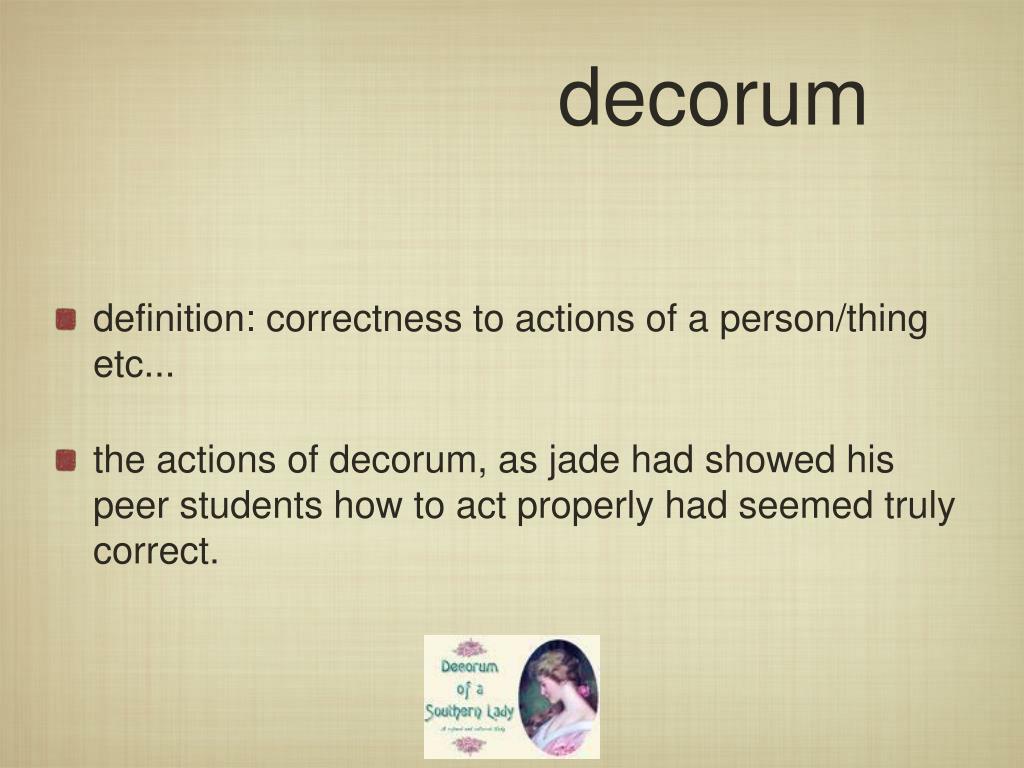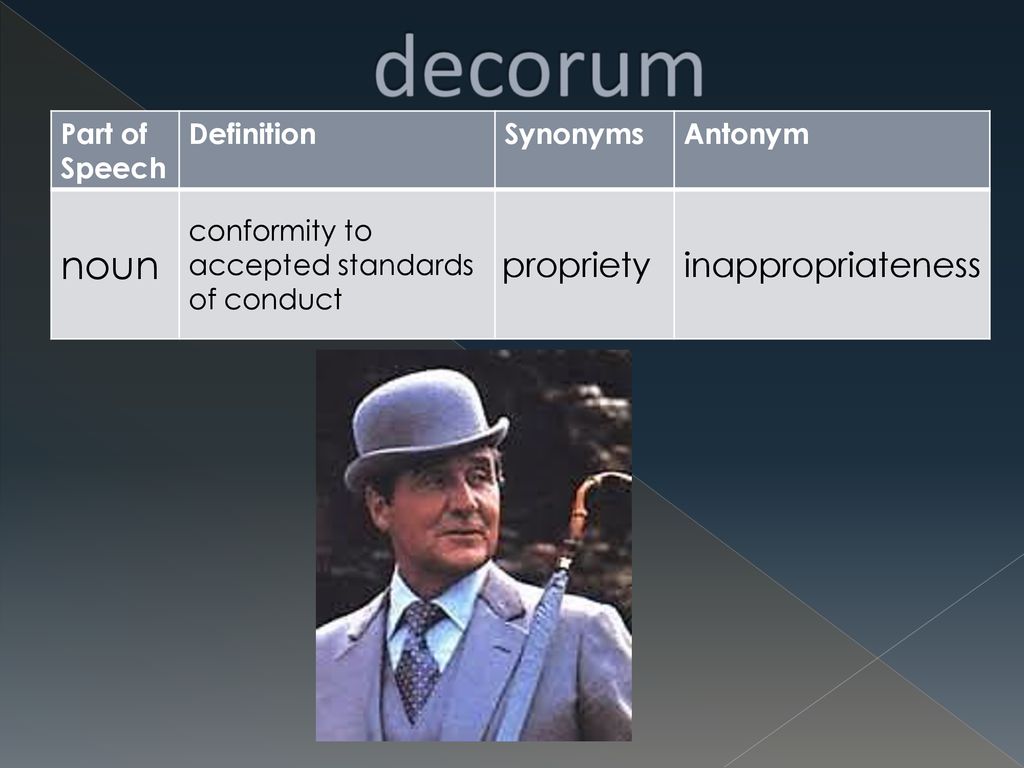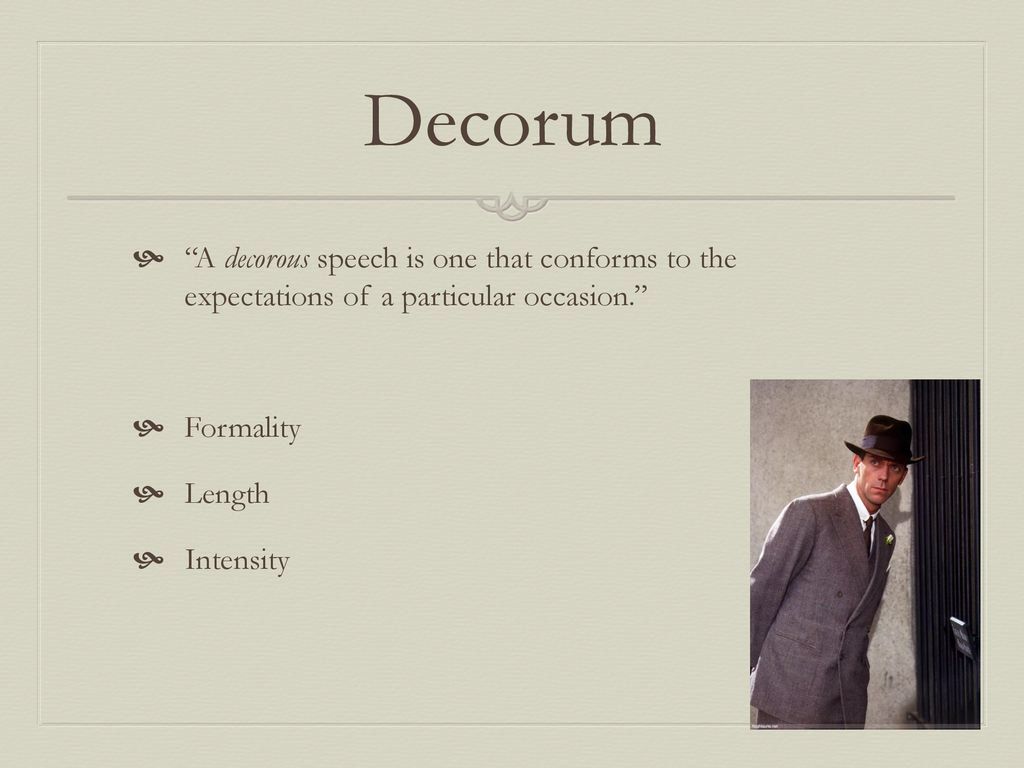Decorum Meaning - Understanding Proper Behavior
Table of Contents
- What is Decorum Meaning, Really?
- Why Does Decorum Meaning Count in Our Daily Interactions?
- How Does Decorum Meaning Show Itself in Different Places?
- Is Decorum Meaning Something We Can All Learn?
Have you ever been somewhere and just felt that things were "right"? Maybe it was a quiet library where everyone whispered, or a serious meeting where folks spoke with a certain kind of respect. That feeling, that sense of things being just as they should be, often comes down to something we call decorum. It's about knowing how to act, how to carry yourself, in a way that fits the moment and the people around you, so that, you know, everything flows smoothly.
It’s more than just being polite, though that is a big part of it. Decorum touches on a deeper idea of what is suitable or fitting for a particular setting. Think about it: the way you chat with a close pal is probably quite different from how you would speak to a new acquaintance, or, say, a person who holds a position of authority. This idea of matching your actions to the situation is, in some respects, at the heart of what we are talking about here.
When we talk about this kind of behavior, we are really exploring how people interact and what expectations exist in different social circles. It is about those unwritten rules that help us all get along, making interactions easier and more pleasant for everyone involved. So, in a way, it is about creating a comfortable and proper atmosphere wherever you might be.
What is Decorum Meaning, Really?
When someone asks about the meaning of decorum, it is about a quality or state of being that shows proper conduct. It is that sense of dignified propriety, a way of acting that demonstrates a good grasp of what is suitable for a given moment. Basically, it refers to behavior that is controlled, calm, and polite, or, you know, just generally well-mannered. It is not about being stiff or unnatural; rather, it is about showing a considerate and respectful way of carrying oneself, which, quite frankly, makes a big difference.
The Heart of Decorum Meaning
The true core of decorum meaning lies in appropriateness. It is about behavior or conduct that is fitting for the situation at hand. For instance, if you were at a very formal dinner party and, say, let out a really loud belch, that would be a clear example of not showing much decorum. Why? Because that kind of action just does not fit the expectations of a polite, fancy gathering. It is about understanding those unspoken agreements we have as people about how we should behave in different places. This idea of what is suitable extends to many parts of our lives, really.
It is also about how we handle ourselves, keeping things calm and collected. Someone who shows decorum is someone who can keep their emotions in check, speak thoughtfully, and act in a way that respects those around them. This controlled aspect does not mean being robotic, but rather being aware of your surroundings and the effect your actions have on others. So, it is a way of being considerate, more or less.
Another way to think about the meaning of decorum is as an observance or a requirement of polite society. These are the things we generally agree upon that make social interactions smoother and more pleasant. It is about understanding and respecting the established conventions and standards of a group or a place. For example, if you are visiting someone's home, you might take off your shoes at the door if that is their custom; that is a small act of decorum. It shows you recognize and respect their way of doing things, which, by the way, is a kind of kindness.
Why Does Decorum Meaning Count in Our Daily Interactions?
Why do we even bother with this idea of decorum? Well, it really helps us all get along. When people show proper and polite behavior, it creates a more comfortable and predictable atmosphere for everyone. Imagine a situation where everyone just did whatever they wanted, without any thought for others; it would be a bit chaotic, would it not? Decorum, in a way, provides a kind of social glue, helping people to understand what to expect from one another, which makes interactions less stressful, for instance.
Decorum Meaning - Its Place in Public
Think about public spaces. When people understand and practice decorum meaning, these places become much more pleasant. Consider a public transport vehicle. If everyone talks loudly on their phones, plays music without headphones, or leaves their rubbish behind, it makes the experience less enjoyable for everyone else. However, if people are quiet, considerate of others' personal space, and keep the area tidy, it creates a much better environment. This is where decorum comes into play, helping to make shared spaces work better for all of us, actually.
It is about showing respect for the collective experience. When you behave in a way that people consider to be correct, polite, and respectable, you are contributing to a positive atmosphere. This is true whether you are at a concert, a park, or even just walking down a street. Your actions, or lack thereof, can affect the experience of others around you. So, in some respects, it is about being a good neighbor, even to strangers.
The idea of proper conduct extends to how we communicate, too. Think about a conversation. Decorum suggests taking turns speaking, listening when others talk, and avoiding interrupting. It means expressing your thoughts in a way that is clear but not aggressive, and being mindful of the feelings of the person you are speaking with. This kind of give and take, this careful way of talking, is a big part of showing decorum, you know, in daily chats.
How Does Decorum Meaning Show Itself in Different Places?
Decorum is not a one-size-fits-all concept; its specific expressions can change depending on where you are. What is considered proper behavior in one setting might be completely out of place in another. This adaptability is a key part of understanding the meaning of decorum. It is about being observant and adjusting your actions to fit the particular circumstances, which, honestly, takes a bit of thought.
Decorum Meaning in Formal Situations
In very formal settings, the rules of decorum can be quite clear and often have significant weight. Take a courtroom, for instance. Court decorum requires that all parties address the judge as "your honor." This is a specific act or requirement of polite behavior within that particular setting. It is not just a suggestion; it is a standard that helps maintain the seriousness and order of legal proceedings. If someone were to shout at the judge or use casual language, they would be showing a lack of decorum, which, very often, has consequences.
Similarly, at a formal ceremony, like a graduation or a wedding, there are expected ways to act. People typically dress in a certain manner, speak in hushed tones during important parts, and generally show reverence for the occasion. These are all elements of decorum meaning in action, helping to uphold the solemnity and importance of the event. It is about recognizing the gravity of the situation and acting accordingly, really.
Even in a business meeting, there is a certain decorum. This might involve arriving on time, listening attentively, not interrupting, and presenting your ideas in a clear and respectful way. These behaviors contribute to a productive and professional atmosphere. It is about creating an environment where serious discussions can happen without unnecessary distractions or disrespect, which, as a matter of fact, is pretty important for getting things done.
Decorum Meaning in Creative Expression
The meaning of decorum also extends into the world of artistic and literary work. Here, it refers to the appropriateness of an element, such as style or tone, to its particular circumstance or to the composition as a whole. For example, a serious drama might call for a formal, somber tone, while a comedy would use a lighter, more playful style. If a dramatic play suddenly included slapstick humor without reason, it might be seen as lacking decorum for that specific piece. It would feel out of place, you know, like a mismatched puzzle piece.
In writing, decorum might mean choosing words and sentence structures that fit the subject matter and the intended audience. A scientific paper would use precise, objective language, whereas a personal letter would be more conversational and warm. The style should match the purpose. This attention to fitting the expression to the context is a subtle but very important aspect of literary decorum. It is about making sure everything works together, more or less, in a pleasing way.
So, whether it is in a painting, a piece of music, or a written story, decorum helps ensure that all the parts feel right together. It is about consistency and suitability, making sure that the overall message or feeling is not undermined by something that just does not belong. This careful consideration of what fits is, arguably, what makes a work feel complete and well-crafted.
Is Decorum Meaning Something We Can All Learn?
Absolutely, yes. Decorum is not something you are simply born with; it is a set of social skills and awareness that can be developed and refined over time. It involves paying attention to your surroundings, observing how others behave in different situations, and learning from those observations. It is about becoming more mindful of your own actions and how they affect the people around you. So, it is, in a way, a continuous process of learning and growing.
One way to cultivate a better sense of decorum is to simply practice polite conduct. This means consciously choosing to be calm, controlled, and respectful in your interactions. It could be as simple as remembering to say "please" and "thank you," or waiting your turn to speak. These small actions, when done consistently, build up a habit of decorous behavior. It is about making these thoughtful actions a natural part of who you are, which, honestly, benefits everyone.
Another helpful step is to become more aware of different social settings and their particular expectations. If you are going to a new kind of event or place, it might be useful to observe for a little while before jumping in. See how people are dressed, how they are talking, and what activities they are doing. This observation helps you understand the unwritten rules of that specific environment, allowing you to adjust your own behavior accordingly. It is about being adaptable, you know, to different social cues.
Ultimately, having a good sense of decorum means having a kind of social intelligence. It is the ability to read a room, understand the mood, and respond in a way that is fitting and respectful. It is about making others feel comfortable and valued through your actions and words. This ability to show proper and polite behavior is a valuable asset in any part of life, really, helping to build stronger connections and smoother interactions for everyone involved.



Detail Author:
- Name : Lee Lockman
- Username : xkoepp
- Email : uruecker@yahoo.com
- Birthdate : 1992-08-04
- Address : 803 Kassulke Branch West Dannieport, CA 54295
- Phone : 1-754-679-2201
- Company : Ledner-Rice
- Job : Production Planner
- Bio : Dolore totam unde ullam corporis ut odit. Architecto nihil ad ea non velit voluptatem. Id est dolor aut voluptate. Enim ipsa qui quae. Ea molestiae eveniet magnam.
Socials
twitter:
- url : https://twitter.com/gloria6892
- username : gloria6892
- bio : Vitae ut quidem quae odio reprehenderit non. In ullam inventore nisi. Aliquid explicabo est enim. Modi expedita quibusdam molestiae ullam quas.
- followers : 2523
- following : 2229
linkedin:
- url : https://linkedin.com/in/wilkinsong
- username : wilkinsong
- bio : Dolorem libero fugit provident.
- followers : 1751
- following : 2952
tiktok:
- url : https://tiktok.com/@wilkinson1985
- username : wilkinson1985
- bio : Incidunt rerum vel tenetur vitae ipsum.
- followers : 1090
- following : 2555
facebook:
- url : https://facebook.com/gloriawilkinson
- username : gloriawilkinson
- bio : Sapiente itaque qui laborum est dolores omnis.
- followers : 3843
- following : 896
instagram:
- url : https://instagram.com/gloria2053
- username : gloria2053
- bio : Ipsum quia ex quam et adipisci est. In rerum et ipsum praesentium dolores non.
- followers : 1238
- following : 2833